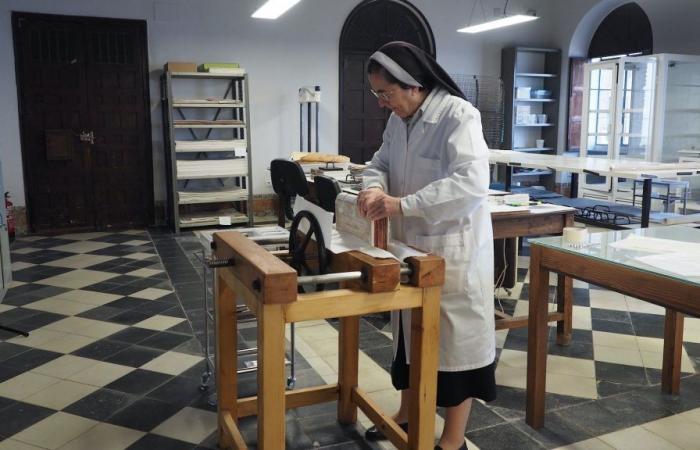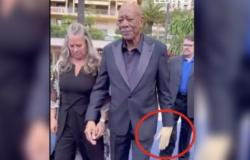María Dolores Díaz de Miranda is a nun and a prestigious professional in conservation
María Dolores Díaz de Miranda studied Medicine and dreamed of saving lives in the missions, until she felt the call to the contemplative life. Today she, as a Benedictine, is dedicated to the restoration of books and documents, and she is one of the best in her field. «There is the idea that the Church cares and preserves… And then there are the professionals. And no, in the Church there are great professionals », she explains to ECCLESIA. «You have to accept what is presented to you by giving yourself. I consider that work is something secondary, a means of expressing the God that inhabits me, of prolonging the creative hands of God,” she points out.
Looked at closely, his work at the head of the Church’s archives is not so different from his vocation as a doctor: «Paper is finite, organic matter and, like the human body, it has a time. Only when we control the factors that accelerate the aging of a document, we still extend its life by 3,000 years,” he smiles. Among these factors, “light, humidity, temperature, pollution…” stands out. “When I pick up a book,” he continues, “I see the level of damage. I make a diagnosis and propose a treatment. Increasingly, the tendency is to intervene as little as possible, because it is considered that the binding itself offers information about the document. If it can be without disassembling the book, I will do it this way. If not, it is removed page by page and restored. But what they ask us to restore is usually in poor condition.
Before acting, you must complete a series of analyzes: «We measure the PH, because acidity is very harmful to paper. We see the types of fibers there are, if the ink is oxidized, etc.” Once the tests are done, the treatment is decided, almost always with baths: “Allow harmful acidic substances to dissolve in water. “7% of the weight of paper is water, so when you immerse it, there is more bonding between fibers, improving the internal framework.”
Scrolls
The parchment requires “a dehydration program: we put it in a chamber where steam enters, like in a sauna. Instead of wetting it, it sucks water according to its need. Then you just have to take it out and tighten it. If the ink is corrosive, “it is neutralized with calcium hydroxide in these baths, which when dried in contact with the oxygen in the air turns into salt and neutralizes the acidity.” Furthermore, when there is no paper, “I make grafts. “I use the old system, making pulp from rags.”
The various processes, which also include assembly, binding, gluing and sewing, are explained with passion and exhaustiveness in the videos he uploads to his social networks. Last May, she participated in the archivists’ days organized by the Episcopal Conference. «The service that the Church is doing in terms of preservation is impressive. We tend to give a lot of artistic value to the codices, but, at the level of information, the inscriptions, records and accounting books of the parishes are the history of Spain itself.
Although she is a well-known professional, she emphasizes the pleasure that comes from “doing what I have to do every day, without further ado, without the need to stand out. Sometimes, she evangelizes herself just by being there, and also by her attitude. His, of course, is unbeatable: «When I decide on a treatment, it is not closed, because one essential thing is the dialogue between the restorer and the piece. Sometimes they bring restaurant students to us to practice and I have to advise them to work without helmets, at least an hour. You have to feel the work, it is a communication with it. How will you know if you are stretching a scroll correctly if you don’t have it in your mind? Working in silence is great. And with touch, when you have to glue or moisten a paper. It’s a therapy to stop thinking about things. You stop, you surrender and you dialogue with the work. It makes no sense for people to cook with the television on and then take relaxation courses. I think these balances are something that we have maintained very well in the tradition of the Church.






